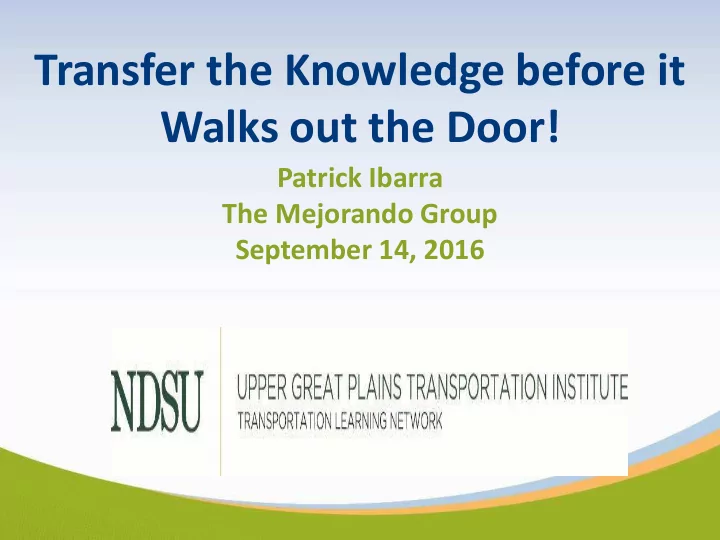

Transfer the Knowledge before it Walks out the Door! Patrick Ibarra The Mejorando Group September 14, 2016
Today’s Facilitator Patrick Ibarra Former City Manager and HR Director Founder of The Mejorando Group (925)518-0187 patrick@gettingbetterallthetime.com 2
The Numbers Only 13% of local government managers are under 40 • while nearly 71% were under 40 in the early 1970’s. Each day, 10,000 people turn 65 years of age. First time, • millennials now outnumber baby boomers in the workplace 76 million to 75 million. Millennials comprise 1/3 of the current workforce at 53.5 million and by 2025 they will make-up 75% of the workforce. Average age of a local government employees is 44 • compared to average age of a private-sector employee which is 39. 3
More Numbers In 2014, 19% of government workforce reached age 61, • the average retirement age. By 2018, this figure rises to 28% of those working. 49% of local governments reported higher levels of • retirement in 2013 compared with 2012. 22% had reported that employees had accelerated their • retirements. 4
Polling slide #1 How satisfied are you with your current knowledge transfer efforts? 1. Very satisfied 2. Somewhat Satisfied 3. Dissatisfied 5
Career First Day Learning Retention of Succession High Planning & Dev. on the Planning Performers Job Knowledge On- Transfer Boarding Performance Recruiting Management & Selection 6
Knowledge Transfer: Drivers 1. Size of workforce 2. Explosion of technology 3. Potential loss of tacit knowledge and impact on service and operations 4. Competitive marketplace and demographic changes – impacts on recruitment and retention 5. Employee Retention not the same as Knowledge Retention 6. Increasing service demands 7
Terminology 8
Types of Knowledge Explicit Tacit 9
Knowledge Management 10
Knowledge Retention Foster Minimize Culture Risk Minimize Goal of Lower Costs For Training Cost Process K&S Bench Repositories Strength 11
Step 1. Identify Knowledge • What knowledge is critical? • Who has critical knowledge? • What is your risk level? • What does it look like? 12
Expert Interviews Apprentices & Wikipedia Trainees On The Job Interns Training Communities of Job Aids Practice Retire to Storytelling Rehire 13
Expert Interviews • Sessions where one or more people, who are considered experts in a particular subject, program, process, policy, etc., meet with others to share their knowledge. • Example: All levels • Benefits • When to use • How to use 14
Polling slide #2 How likely are you to utilize expert interviews? 1. Very Likely 2. Somewhat Likely 3. Unlikely 15
Apprentice, Trainees & Interns • Formal arrangements where a person gains practical experience or knowledge by working for a prescribed period of time under the supervision of more experienced workers. • Example: Field Training Officer – Law Enforcement • Benefits • When to Use 16
Communities of Practice • Is a group of individuals, sharing a common working practice over a period of time, though not necessarily a part of a formally constituted work team. • Example: Utilities – Field Workers • Benefits • Obstacles • When to Use 17
Polling slide #3 How likely are you to utilize communities of practice? 1. Very Likely 2. Somewhat Likely 3. Unlikely 18
Storytelling • Organizational stories (i.e. anecdotes) and future scenarios • Example: Lunch and learn • Benefits • Obstacles • When to use 19
Retire to Rehire • Employees who retire, return to work in same job • Example – Several agencies using • Benefits • Obstacles • When to use • How to use 20
Polling slide #4 We are currently using the retire to rehire approach. 1. Yes 2. No 3. Don’t know 21
Job Aids • Include things such as checklists, flow diagrams, reference tables, decision tree diagrams, etc., that provide specific, concrete information to the user and serve as a quick reference guide to performing a task. • Example – Several agencies using • Benefits • When to use 22
On-The-Job Training • Any kind of instruction that takes place at the actual job site and involves learning tasks, skills, or procedures in a hands-on manner. • Examples – Entry level and non-supervisory • Benefits • Obstacles • When to use 23
Polling slide #5 How satisfied are you with your current on the job training programs? 1. Very satisfied 2. Satisfied 3. Dissatisfied 24
Wikipedia • A wiki is a collaborative website that provides an easy way for people to upload and edit information online. • Benefits • Obstacles • When to use • How to use 25
Outcomes 1. Continue your organization’s “way of doing business” 2. Transfer high value knowledge 3. Minimize loss of knowledge 4. Build internal bench strength 5. Create knowledge repositories 6. Cohesive strategy 7. Systematic and replicable approach 26
Next Steps for You… 1. Create a sense of urgency 2. Appoint a knowledge champion 3. Start with “critical” knowledge 4. Begin on a small scale – Pilot 5. Move along multiple fronts 6. Leverage existing approaches 7. Provide help throughout the organization quickly 27
Polling slide #6 How likely are you to pursue a knowledge transfer program? 1. Very likely 2. Somewhat likely 3. Unlikely 28
The Mejorando Group Who are we? A Change and Organizational Effectiveness • Consulting Practice. What do we do? Partner with organizations and implement • solutions to improve organizational performance. • How do we do that? We provide expertise in: Succession Planning & Talent Management Organizational Effectiveness Services Strategic Planning Facilitation Services Leadership and Management Skills Training • How do you contact us? Patrick Ibarra, 925-518-0187 or patrick@gettingbetterallthetime.com Web address: www.gettingbetterallthetime.com • Our mission is to help organizations and their members “get better all the time” 29
Recommend
More recommend